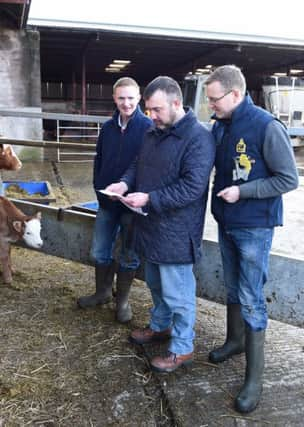On farm experience prompts BVD seminar


On-farm experience with BVD has prompted Armagh veterinary surgeon, John Henderson from the Orchard Vet Centre to organise an open meeting for all farmers, in conjunction with Countryside Services.
John highlights the example of Dougie and Anne McKenzie who farm at Moy, Dungannon. They were rearing a batch of heifer weanlings from which they hoped to source some suckler replacements for their spring calving herd of Aubrac cows.
Advertisement
Advertisement
Having attended an advisory meeting where BVD screening was discussed, they decided to blood test these heifers as there had been many more niggling health problems in the group than they would have liked. In Dougie’s opinion antibiotics had been necessary on too many occasions.
One of the heifers in the batch tested positive for BVD virus, i.e. it was Persistently Infected or a PI. This animal looked perfectly normal but as a calf it had given trouble on a few occasions with recurrent pneumonia. This calf was infecting its comrades with BVD virus which was making them much more susceptible to infections and ill health. The PI was removed from the batch, isolated and slaughtered at 15 months of age.
John emphasised: “If this animal had been selected as a heifer replacement for the suckler herd there could have been serious consequences.”
Dougie commented: “Since this incident we have been tissue tagging all calves at birth with Caisley tags supplied by Countryside Services. These tags have a very high retention rate and come with a back-up advisory service which is very useful when you first start tissue tagging.
Advertisement
Advertisement
“Once you have done a few calves it is quite a simple task but it is useful to have the demonstration and advisory service provided by Countryside Services. It has all the information about storing and forwarding samples, what to do in the event of lost samples or a positive test etc. and also includes back-up advice from your veterinary surgeon.”
John Henderson emphasises that farmers should view the compulsory tissue tagging scheme as a farmer friendly scheme – not only will it help to identify new born calves which are PI positive, and who will, therefore, spread the disease, but the discovery of a positive animal will help the farmer to locate further BVD infections in the herd.
He added: “This virus weakens the immune system and allows common infections to get a grip on the cattle. If the virus gets into pregnant cows it can kill the developing embryo causing more cows to run to the bull. Any foetuses that survive run the risk of being born as PI’S, continuing the cycle of BVD infection into the next year. BVD can thus become an ongoing cause of lost income.”
The Armagh meeting is open to all farmers whether they are from the Armagh area or not. Ian McNiece from Countryside Services explained: “There will be a full explanation on how to use the tissue tagging system, and veterinary advice on all aspects of the sampling procedures particularly on dealing with positive results.”
Advertisement
Advertisement
The meeting will take place in the City Hotel, Armagh next Tuesday (9th February) at 7.30 PM. For further details Countryside Services can be contacted on 028 8778 9770 while Orchard Vet Centre can be contacted on 028 3751 0088.